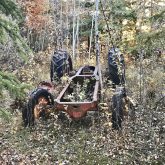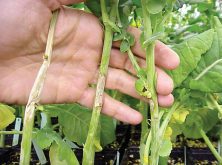Man I have to start off my 30-something year of writing agricultural stories for this company with a correction. Fortunately I only had to take off one glove to do it.
One of my Hutterite reader friends phoned the other night to point out in my December column where I was talking about available agricultural land in the world and I said Canada had about 0.25 per cent of world cropland. I was off by a decimal point. That should have read that Canada has about 2.3 per cent of the global cropland area. And since I have a bit of room I can add that, according to this U.S. Geological Survey report, cropland in Canada is about 4.7 per cent of total area of Canada. And that ain’t fake news.
Read Also

Avoid these thought traps when investing
Investing for Fun and Profit: Let’s review a list, by renowned fund manager Peter Lynch, of the most dangerous things that stock market investors can say to themselves, or to others.
Back to my reminiscing… yes it was about 30 years I started writing for this company. Actually, (and here’s another correction) I started work as a field editor for Country Guide magazine in the late 1980s and although technically Grainews was part of the company then, it was the goofy-cousin farm paper published from a different office by United Grain Growers and we over at the Public Press magazine division had nothing to do with “THEM.”
A few years after I started everything merged into a new company or division called Farm Business Communications (FBC). After some ownership evolution over the years Country Guide, Grainews, Canadian Cattlemen Magazine, Manitoba Co-operator and Alberta Farmer Express are all now under the FBC banner. We’re just one big happy family — well I am happy, I shouldn’t speak for everyone else.
I came aboard with Country Guide as a writer who knew a little bit about agriculture, rather than the opposite, which is fairly common in the industry —someone with an ag degree or experience who has to learn about writing. And since you have to be off-the-scale smart to be a writer, many of those poor aggy souls still struggle.
Not me, though. I had a writing background I just had to figure out how many steers you could fit into a double-eight herringbone milking parlour after they calve.
Believe it or not I knew very little about western Canadian agriculture 30 years ago. The first farm story I ever did was with Don Opp and his family near Claresholm. The assignment — learn about his conservation farming methods.
Okay, great so what is conservation farming?
You can imagine how the interview went. He was a very patient man.
So the challenge as a writer is first not only to collect the information as accurately as I can, but then the real trick is to put an article together so it sounds like I actually know what I am talking about. One saving grace is that I knew people to call to talk to about these things. “So I got this guy with wheat, an air seeder thing, shanks on some kind of spacing and now there is this stubble in the field — what is he talking about? And hopefully that agrologist or researcher could explain it in simple terms, preventing me from having to make 10 phone calls back to the farmer and look totally stupid.
I’ve come a long way baby. I have learned lots. Mostly I have learned I know absolutely nothing about agriculture, but if you tell me what you are doing, I can write a story about that.
I do have some very weak knowledge areas.
Machinery comes to mind. I barely know the difference between a combine concave and a piston, so thank heavens for our machinery editor Scott Garvey who knows about this stuff. (I don’t actually know that he really knows this stuff, but he can write like he knows it and that’s all that matters.) What really matters is that I don’t have to do it.
Anyway, 30 years on the job and I am still learning. Fortunately there have been no new developments in the agriculture industry over the past 10 years so that has given me a bit of a window to get caught up. I just hope they don’t pick 2018 as the year to start making a bunch of changes.















